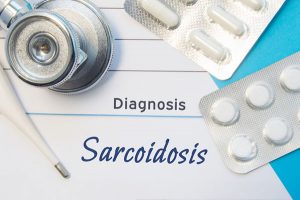5 things to know about sarcoidosis
Sarcoidosis is an inflammatory disease that can affect any organ. Most people who have sarcoidosis have few signs of the disease. It is most often diagnosed when a chest x-ray is done for another reason, and is found to be abnormal. However, because sarcoidosis can affect the entire body, a wide variety of symptoms may be seen with the disease, including fatigue, night sweats, headaches, joint pain and more.
Sarcoidosis is no longer considered a rare disease but it is still relatively uncommon and often misdiagnosed.
Below are five things to know to better identify and manage the disease.
1. You’re not alone. While the disease is not well-known, it is estimated that there are more than 200,000 people living with sarcoidosis in the U.S.
2. It’s often misdiagnosed as asthma. “About 90 percent of patients suffer from granulomas in the lungs that result from inflammation,” says Dr. Daniel Culver, DO, director of the Interstitial Lung Disease Program at the Cleveland Clinic. “The symptoms, which can include coughing, wheezing and chest discomfort, are often misdiagnosed as asthma.”
3. Adults in their 20s and 30s are most susceptible. Sarcoidosis can affect people of any age, race and gender. Mostly, though, the disease strikes adults between the ages of 20 and 40, although a number of studies have suggested a second peak after 50 years, especially in women. It is most common in African-Americans and people of Northern European—particularly Scandinavian—descent. The disease is slightly more common in women than in men.
4. The disease manifests differently in different groups of people. While the lungs and lymph nodes are affected in almost everyone who has sarcoidosis, African-Americans and people of Japanese descent are more likely to have eye involvement than Caucasians. Skin lumps are most likely to affect people of Northern European descent, and those with a Japanese background.
5. Symptoms may come and go. Sarcoidosis can mimic a bad cold leading patients to believe they are suffering from the flu rather than a chronic disease. Additionally, sarcoidosis symptoms often overlap with other illnesses, which can hinder diagnosis.

